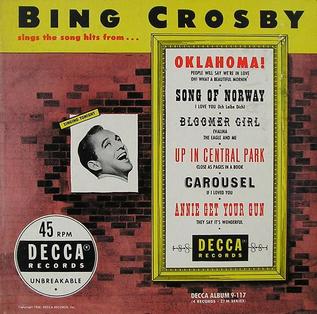Traditional pop is Western pop music that generally pre-dates the advent of rock and roll in the mid-1950s. The most popular and enduring songs from this era of music are known as pop standards or American standards. The works of these songwriters and composers are usually considered part of the canon known as the "Great American Songbook". More generally, the term "standard" can be applied to any popular song that has become very widely known within mainstream culture.
This is a list of notable events in music that took place in the year 1943.
"Lover" is a popular song composed by Richard Rodgers with lyrics by Lorenz Hart. It was sung in the movie Love Me Tonight (1932) by Jeanette MacDonald.
"So in Love" is a popular song, written by Cole Porter, from his musical Kiss Me, Kate, which was based on Shakespeare's The Taming of the Shrew. It was sung in the show by Patricia Morison, reprised by Alfred Drake, and further popularized by Patti Page in 1949.
"Oh, What a Beautiful Mornin'" is the opening song from the musical Oklahoma!, which premiered on Broadway in 1943. It was written by composer Richard Rodgers and lyricist/librettist Oscar Hammerstein II. The leading male character in Oklahoma!, Curly McLain, sings the song at the beginning of the first scene of the musical. The refrain runs: "Oh, what a beautiful mornin'! / Oh, what a beautiful day! / I've got a beautiful feelin' / Ev'rythin's goin' my way." Curly's "brimming optimism is perfectly captured by Rodgers' ebullient music and Hammerstein's buoyant pastoral lyrics."
"I Have Dreamed" is a show tune from the 1951 Rodgers and Hammerstein musical, The King and I. In the original Broadway production it was sung by Doretta Morrow and Larry Douglas. It has since become a standard, with many artists recording the song.
"Do Nothing till You Hear from Me" is a song with music by Duke Ellington and lyrics by Bob Russell. It originated as a 1940 instrumental that was designed to highlight the playing of Ellington's lead trumpeter, Cootie Williams. Russell's words were added later. In 1944, Ellington's own recording of the song was a number one hit R&B chart for eight non-consecutive weeks and number six on the pop chart.
"I'm Getting Sentimental Over You" is a song recorded by Tommy Dorsey and His Orchestra. The words were written by Ned Washington and the music was written by George Bassman. It was first performed in 1932. The original copyright is dated 1933 and issued to Lawrence Music Publishers, Inc. The copyright was assigned to Mills Music, Inc. in 1934. Noni Bernardi, a saxophonist with the Dorsey orchestra arranged this song.
"Please Don't Talk About Me When I'm Gone" is a song published in 1930. It was written by Sam H. Stept with lyrics by Sidney Clare. The original publication also credited singer Bee Palmer as co-composer.
"Day by Day" is a popular song with music by Axel Stordahl and Paul Weston and lyrics by Sammy Cahn.
"I'm Beginning to See the Light" is a popular song and jazz standard, with music written by Duke Ellington, Johnny Hodges, and Harry James and lyrics by Don George and published in 1944.
"I Didn't Know What Time It Was" is a popular song composed by Richard Rodgers with lyrics by Lorenz Hart for the 1939 musical Too Many Girls. Introduced by Richard Kollmar and Marcy Westcott in the stage musical, early hit versions were recorded by Benny Goodman and by Jimmy Dorsey .
It was then performed by Trudy Erwin and Richard Carlson in the 1940 film adaptation produced by RKO. The song was later interpolated into the score of the 1957 film Pal Joey, sung by Frank Sinatra, and has become a jazz standard.

"Chicago" is a popular song written by Fred Fisher and published in 1922. The original sheet music variously spelled the title "Todd'ling" or "Toddling." The song has been recorded by many artists, but the best-known versions are by Frank Sinatra, Ben Selvin and Judy Garland. The song alludes to the city's colorful past, feigning "... the surprise of my life / I saw a man dancing with his own wife", mentioning evangelist Billy Sunday as having not been able to "shut down" the city, and State Street where "they do things they don't do on Broadway".
"Sunday, Monday or Always" is a 1943 popular song with music by Jimmy Van Heusen and lyrics by Johnny Burke.
"Moonlight Becomes You" is a popular song composed by Jimmy Van Heusen with lyrics by Johnny Burke. The song was written for the Paramount Pictures release Road to Morocco (1942) and published in 1942 in connection with the film. Vic Schoen wrote the arrangement.

'40s Junction is a commercial-free music channel on the Sirius XM Radio platform, broadcasting on channel 71; as well as Dish Network channel 6071. The channel mainly airs big band, swing, and hit parade music from 1936 to 1949, with occasional songs from the early-1950s. Until May 7, 2015, the station was known as '40s on 4, with programming being broadcast on channel 4, as part of the "Decades" line-up of stations. It was later rechanneled to be nearer to stations featuring similar genres of music, such as jazz and standards. During its first four months on Ch. 71, the station was known simply as '40s. The station was rebranded as 40s Junction on August 13, 2015.

"Poinciana" is a song by Nat Simon with English lyrics by Buddy Bernier and Spanish lyrics written in 1936 by Manuel Lliso.

Bing Crosby Sings the Song Hits from Broadway Shows is a Decca Records compilation 78rpm album of phonograph records by Bing Crosby featuring some of the hits from Broadway musicals.
"Sweet and Lovely" is an American popular song of 1931, composed by Gus Arnheim, Charles N. Daniels, and Harry Tobias.
Trudy Erwin was an American singer and actress in films who was a vocalist with the Kay Kyser orchestra in the 1940s. She recorded several hit songs including the 1943 duets with Bing Crosby "People Will Say We're In Love (#1) and "Oh! What A Beautiful Mornin' (#4).



